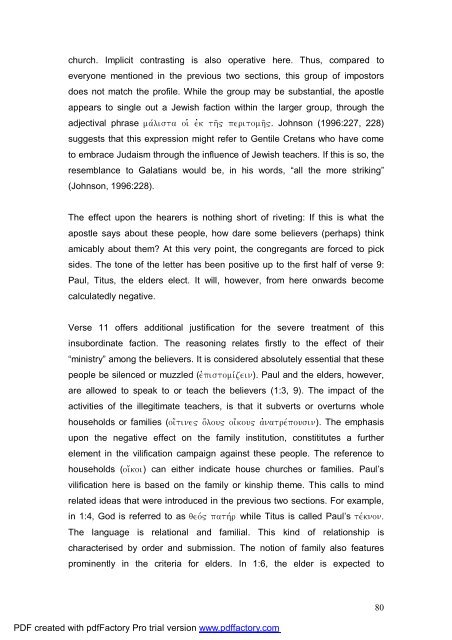A Text centred rhetorical analysis of Paul's Letter to Titus
A Text centred rhetorical analysis of Paul's Letter to Titus
A Text centred rhetorical analysis of Paul's Letter to Titus
Create successful ePaper yourself
Turn your PDF publications into a flip-book with our unique Google optimized e-Paper software.
church. Implicit contrasting is also operative here. Thus, compared <strong>to</strong><br />
everyone mentioned in the previous two sections, this group <strong>of</strong> impos<strong>to</strong>rs<br />
does not match the pr<strong>of</strong>ile. While the group may be substantial, the apostle<br />
appears <strong>to</strong> single out a Jewish faction within the larger group, through the<br />
adjectival phrase mavlista oiJ ejk th`" peri<strong>to</strong>mh`". Johnson (1996:227, 228)<br />
suggests that this expression might refer <strong>to</strong> Gentile Cretans who have come<br />
<strong>to</strong> embrace Judaism through the influence <strong>of</strong> Jewish teachers. If this is so, the<br />
resemblance <strong>to</strong> Galatians would be, in his words, “all the more striking”<br />
(Johnson, 1996:228).<br />
The effect upon the hearers is nothing short <strong>of</strong> riveting: If this is what the<br />
apostle says about these people, how dare some believers (perhaps) think<br />
amicably about them? At this very point, the congregants are forced <strong>to</strong> pick<br />
sides. The <strong>to</strong>ne <strong>of</strong> the letter has been positive up <strong>to</strong> the first half <strong>of</strong> verse 9:<br />
Paul, <strong>Titus</strong>, the elders elect. It will, however, from here onwards become<br />
calculatedly negative.<br />
Verse 11 <strong>of</strong>fers additional justification for the severe treatment <strong>of</strong> this<br />
insubordinate faction. The reasoning relates firstly <strong>to</strong> the effect <strong>of</strong> their<br />
“ministry” among the believers. It is considered absolutely essential that these<br />
people be silenced or muzzled (ejpis<strong>to</strong>mivzein). Paul and the elders, however,<br />
are allowed <strong>to</strong> speak <strong>to</strong> or teach the believers (1:3, 9). The impact <strong>of</strong> the<br />
activities <strong>of</strong> the illegitimate teachers, is that it subverts or overturns whole<br />
households or families (oi{tine" o{lou" oi[kou" ajnatrevpousin). The emphasis<br />
upon the negative effect on the family institution, constititutes a further<br />
element in the vilification campaign against these people. The reference <strong>to</strong><br />
households (oi[koi) can either indicate house churches or families. Paul’s<br />
vilification here is based on the family or kinship theme. This calls <strong>to</strong> mind<br />
related ideas that were introduced in the previous two sections. For example,<br />
in 1:4, God is referred <strong>to</strong> as qeov~ pathvr while <strong>Titus</strong> is called Paul’s tevknon.<br />
The language is relational and familial. This kind <strong>of</strong> relationship is<br />
characterised by order and submission. The notion <strong>of</strong> family also features<br />
prominently in the criteria for elders. In 1:6, the elder is expected <strong>to</strong><br />
PDF created with pdfFac<strong>to</strong>ry Pro trial version www.pdffac<strong>to</strong>ry.com<br />
80

















